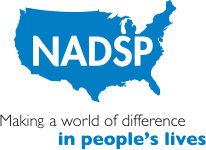
DSPs & The Development Of An Individualized Plan
The following article is part of an ongoing series about the NADSP Competency Areas. The NADSP Competency Areas offer DSPs the opportunity to address challenges, work on issues identified by the person they support, or assist a person in pursuing a particular goal. Each Competency Area has corresponding skill statements that describe the knowledge and skills DSPs must have to demonstrate competency in each area.
This blog is about the skill statement “The competent DSP assists and/or facilitates the development of an individualized plan based on participant preferences, needs, and interests,” within the NADSP Competency Area: “Facilitation of Services.”
Inside The Competency Area
Facilitation of Services
Direct support professionals (DSPs) must be knowledgeable about a range of participatory planning techniques, and they also must be skilled in implementing individualized support plans in a collaborative and expeditious manner. Facilitating services is a primary competency of any direct support professional. This goes beyond simply providing support; it involves actively helping individuals achieve their personal goals. A skilled DSP understands various person-centered planning techniques, such as MAPS (Making Action Plans) or Essential Lifestyle Planning to guide meetings and discussions and to ensure the person’s voice is at the center of the process.
The DSP’s role is to be in partnership, not a “boss” or authority. They work alongside the individual, their family, and other team members to translate a vision into a clear, actionable plan. This requires strong communication and organizational skills to ensure that tasks are completed efficiently and that everyone involved is working towards the same objectives. Ultimately, the goal is to create a dynamic plan that empowers the person supported and adapts to their lives.
The competent DSP assists and/or facilitates the development of an individualized plan based on participant preferences, needs, and interests.
Inside The Skill Statement
The competent DSP assists and/or facilitates the development of an individualized plan based on participant preferences, needs, and interests.
As DSPs assist and/or facilitate individualized plans they must base everything contained in that plan on the preferences, interests and needs of the person supported. This underscores the fundamental principle of person-centered supports. It’s not about what DSPs may think is best for someone, but about honoring the person’s autonomy and self-determination. By grounding all aspects of a plan in the person’s preferences, needs, and interests, DSPs ensure that support is meaningful and relevant.
This approach prevents the creation of generic, ‘one-size-fits-all’ plans and instead establishes a partnership where the person is the expert on their own life. When plans reflect the person’s true desires, they are more likely to be engaged, motivated, and successful in achieving their goals. This leads to increased independence and improved quality of life. This is the basis of a more respectful and empowering support relationship.
Putting It All Into Practice
Direct Support Professionals can apply this principle of collaborative partnership by using active listening and strong communication skills. Instead of simply following a written plan, they should engage with the person they support in conversations about their goals, preferences and interests. This means asking open-ended questions like, “What would you like to do this weekend?” or “What kind of job would you be interested in?” rather than making assumptions about what they think a person wants. DSPs build relationships by listening carefully to thoughts, feelings and aspirations. DSPs must be skilled at gathering and documenting this information to ensure it remains in a document or support plan.
DSPs should also effectively communicate the person’s desires to family members, case managers, and other team members, ensuring everyone is working toward the same objectives. This might involve facilitating or co-facilitating team meetings and providing updates about the progress of a person’s goals and objectives in life.
The person centered plan should be flexible, and the DSP’s role is to ensure it adapts as the person’s aspirations and needs change. A plan is a living document. A skilled DSP continuously monitors the person’s progress and is willing to adjust the plan as the person evolves and grows. This ensures that the all direct support services remain relevant and effective.
Do with, NOT for. Instead of doing things for the person, the DSP teaches skills and provides supports that build on the person’s strengths. By acting as a partner and advocate, the DSP empowers the person they support to have true control over their own life. This can be anything from teaching cooking skills to assisting with self-advocacy, all with the goal of increasing independence and self-determination.
Finally, the DSP must always refer to the NADSP Code of Ethics as they go about facilitating services. Self-determination and being person centered must be balanced with promoting physical, emotional and psychological well-being. By consistently applying the skill and competence associated with Facilitation of Services, a competent DSP can work to empower the person they support to lead a self-directed and fulfilling life.
Quick Tips
How can you help embrace this skill statement and implement it? Here are some quick tips!
-
- Learn how to read support plans and know that they were likely written at a single point in a person’s life. Be careful.
- Always ask the person you support about “how” they feel about their levels of service and supports.
- Be sure that the people you support are ALWAYS involved in any support planning processes, meetings and ANYTHING that involves their life.
- Do not be afraid to advocate with the people you support for anything that they feel is inappropriate or not relevant to their well-being and support needs.
- Ask yourself if you would want the level and types of supports, interventions, goals and objectives in your life, in relation to the person you support?
- Always be on the lookout for anything that is aversive or restrictive in a person’s plan and work tirelessly to eliminate them in the person’s life.
NADSP Competency Areas
The NADSP Competency Areas offer DSPs the opportunity to address challenges, work on issues identified by the person they support, or assist someone in pursuing a goal.
You May Also Be Interested In …

Let’s Talk: Beyond Companionship: How Dogs Support People To Thrive

Let’s Talk: The Art of Connection: Establishing and Repairing Rapport in Direct Support Settings

Let’s Talk: Summertime and The Living Should Be Easy: Supporting People with Significant Intellectual and Developmental Disabilities in Summer Activities

Let’s Talk: Embracing Diversity Equity and Inclusion: A Pathway to Professional Excellence for DSPs

Let’s Talk: Burnout: Reclaiming Mental Wellness in Direct Support Work

Let’s Talk: Flipping the Switch: Compassion Fatigue to Compassion Satisfaction and Psychological Safety for Direct Support Professionals

Let’s Talk: Sexuality and Healthy Relationship Knowledge is Power

Let’s Talk: Balancing Joy, Boundaries, and Belonging: The Ethical Role of DSPs in Holiday Celebration and Connection

Webinar: The Future of COVID-19 and Vaccines

